Government Structure—Not Just Personnel—Needs to Change
The events of the last year, culminating in the Trump/GOP tax bill, show that just revamping the "spirit" of our corporate totalitarian state wouldn't do much good.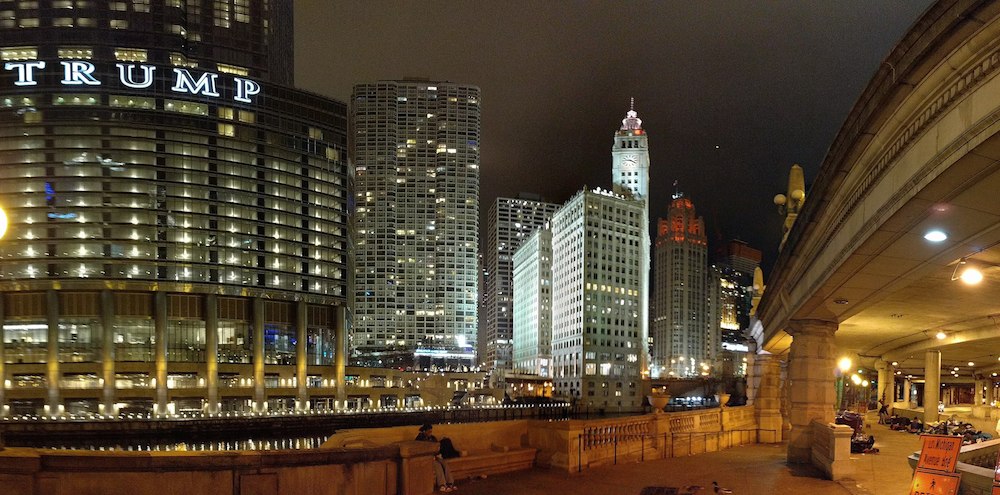 A homeless encampment across from Trump Tower in Chicago. (Wikimedia Commons)
A homeless encampment across from Trump Tower in Chicago. (Wikimedia Commons)
I rode a Trailways bus from Iowa City to Chicago’s Near West Side Greyhound station two weekends ago. I was traveling to my past and future home city to give a presentation on the state of American politics to the Open University of the Left.
For 4½ hours, most of my fellow passengers alternated between nodding off and performing various actions—texting, talking, surfing the internet—with their smartphones and computers.
Except for a middle-aged man who briefly looked at a Bible, not a single other passenger that I could see read anything in print—a book, a magazine or a newspaper.
A young woman sitting next to me spent the bulk of the journey swiping through online cartoons on her phone.
A woman sitting two rows ahead spoke loudly on her cellphone about her love life to a series of people whose disinterest was audible.
A young man across the aisle from me typed madly on his laptop. He was interacting with people on Facebook. A conversation partner appeared on the screen, followed by a “Star Wars” movie trailer.
Conversation was minimal between passengers, most of whom wore ear devices connecting them to the cyberworld as the bus hurtled past farm fields and exit ramps.
The driver, himself fitted with an earbud, did not speak to his riders. Video screens blared a safety video warning that “assaulting” or being “aggressive to the driver” would lead to being “prosecuted to the full of extent of local, state, and federal law.” A shiny black surveillance ball glowered at us from above the front window. Two of the passengers wore electronic monitoring bracelets around their ankles.
I was reminded of Ray Bradbury’s dystopian novel “Fahrenheit 451.” In Bradbury’s dreaded future, a totalitarian police state abolished books, established widespread electronic surveillance, and delivered propaganda and childish entertainment culture to atomized and spectacular police-state images and sounds through glowing flat telescreens and “thimble” and “seashell radios” attached to people’s ears. The novel portrayed people speaking to distant “friends” through a “digital wall”—the same terminology that Facebook would use years later for the digital hub that enables friends to post and see messages.
“The loneliness that can come from constantly paying attention to the screens around you, rather than the life around you,” wrote one Washington Post commentator after Bradbury died five years ago, was “a prevalent theme in Bradbury’s work.”
We arrived at the Chicago terminal, where travelers were monitored by police and private security guards, some wearing bulletproof vests. Surveillance cameras were ubiquitous.
Six large telescreens tilted down above the crowd, blaring CNN coverage of the plutocratic Republican tax bill soon to be signed, despite its public approval rating of only 25 percent, by Donald Trump. The broadcast could be heard loudly from ceiling speakers in the terminal restrooms.
Nobody among the silent and huddled masses milling around the dismal terminal gave so much as a passing glance up at the talking heads. CNN might as well have been streaming images of water boiling or paint drying as far my fellow travelers were concerned.
I stood, head tilted up, mesmerized by the glowing cable news. The network put up old clips of Trump insisting that the tax “reform” would hurt the wealthy, himself included, but help everyone else. Expert CNN commentators smiled as they acknowledged that this was an absurd, baldfaced lie.
Nothing new there: Trump’s deception is standard operating procedure for him. “Boss Tweet” is like something from George Orwell’s dystopian novel “1984,” in which the totalitarian state told its subjects that 2+2=5, Love is Hate, War is Peace, Freedom is Slavery, and Ignorance is Freedom. It’s called turning reality upside down.
Trump, CNN reported, was delighted to have recently received praise from his good friend Vladimir Putin. A cable commentator noted that numerous White House insiders have reported that Trump has special admiration for three world leaders: Putin, Turkey’s Recep Erdogan and China’s Xi Jinping. Trump admires how these strongmen have silenced their opposition and bent their nation’s political institutions to their will.
The last thing I learned from CNN at the Greyhound station was that Trump had forbidden the Centers for Disease Control and Prevention to use the following words and phrases: “evidence-based,” “science-based,” “vulnerable,” “entitlement,” “diversity,” “transgender,” and “fetus.” In Orwell’s novel, words the Big Brother state didn’t like were banned, abolished—sent “down the memory hole.” We know, of course, that Trump’s ecocidal Environmental Protection Agency was given the same Orwellian order regarding “climate change”—a very basic term describing the leading threat to continued human existence, the biggest issue of our or any time.
Heading out of the Greyhound station and walking past homeless tents along the banks of the Chicago River, I was struck by the relevance of another great dystopian novel of the last century: Aldous Huxley’s “Brave New World.” The homeless camp was curiously juxtaposed against the shimmering glass corporate skyscrapers rising above and east of the river, like something out of John Carpenter’s classic dystopian science fiction movie “They Live.” Chicago’s downtown Loop and Gold Coast were full of happy, well-dressed white people caught up in a frenzy of Christmas shopping and theater-going. They laughed and smiled as they hurried past mostly African-American beggars sitting on street corners and next to department stores’ cheerful holiday window displays.
The glowing and giant Trump Tower, a site of raucous mass protests a year ago, loomed above the North Loop without the slightest hint of “resistance.” The president’s approval rating may have stood at an epically low 32 percent. His Federal Communications Commission may have just brazenly defied public opinion and served the internet’s corporate robber barons (Verizon, AT&T and Comcast) by rolling back net neutrality. His tax “reform” may have been highly unpopular. But the holiday masses cavorting in the Loop and along the Magnificent Mile had better things to do than rage powerlessly against the leading local symbol of the nation’s ugly oligarchy and the Orwellian cabal currently occupying the White House. Many among the more affluent folks skipping past the scattered panhandlers were probably looking forward to reduced taxes.
Orwell’s masses were bludgeoned into submission by state terror and relentless military-state propaganda and surveillance. Huxley’s subordinated populace was amused, narcoticized, titillated, entertained and distracted to democratic death.
It’s nice to know that, as earnest left-liberals like to remind us, most of the population remains progressive and left-leaning in the policy sentiments it expresses to public opinion pollsters. And it’s good that, as the left historian Jerry Harris showed in a sharp presentation to the Open University of the Left last August, Trump does not represent anything close to a real and hegemonic fascist power bloc in Washington and has been subjected to restraints from bourgeois liberal and neoliberal forces in the nation’s ruling class, corporate media and legal system.
But what good, really, is a “silent progressive majority” in the face of an autocracy of concentrated wealth and power? And while real and classic fascism is not a real threat in the United States (at least not yet), the country has developed its own lethal and dangerous system of authoritarian and even totalitarian rule—a system distinct from both the red authoritarianism of the Soviet Union and the brown authoritarianism of Nazi Germany. The American model is what the late Princeton political scientist Sheldon Wolin called “corporate managed democracy,” “democracy incorporated” and “inverted totalitarianism.”
The American ruling class doesn’t want or need brown-shirted, jackbooted masses marching in the streets and saluting charismatic dictators rallying the nation for ethnic purification and hyper-masculinist remaking for permanent mass-enlistment war. It prefers the citizenry apolitical, privatized, distracted, divided and individualized, concerned primarily with consumerism and personal and often trivial pursuits. Under America’s “inverted” corporate totalitarianism, many of the basic objectives of fascism—the defeat of unions and the working class, the degradation of democracy, the enforcement of hierarchy and savage inequality, racial subordination, the marginalization of the Left, racial divide and rule, militarization of society, and permanent arms and war economy—are achieved without the discomfort and uncertainly imposed by barking fuhrers and marching multitudes.
This system relies heavily on the myth that the citizenry gets significant input on policy through the biennial elections that are sold to the populace as the only and real politics that matter. Again and again, people are told that going into a two-(capitalist-)party ballot box for two minutes once every two or four years is a great and glorious exercise in popular self-rule. In reality, as the leading mainstream political scientists Benjamin Page and Martin Gilens have recently shown, American “public” policy consistently reflects the wishes of those with money, not the wishes of the millions of ordinary citizens “who turn out every two years to choose among the preapproved, money-vetted candidates for federal office” (emphasis added). The myth of democracy through elections lives on, however, turning the citizenry into a “corporate-managed electorate.”
Donald Trump is testing the arch-authoritarian waters of this American totalitarianism. Consciously or not, he and his team are seeing how far they can exploit “corporate-managed democracy’s” neoliberal evisceration of democracy and republican-constitutional checks and balances to create an autocratic gangster-capitalist kleptocracy.
It isn’t just Putin, Xi and Erdogan who inspire Trump in his bizarre quest to turn the United States into a banana republic. We might add two other role models: the Filipino strongman Rodrigo Duterte, whose mass-murderous “drug war” has garnered Trump’s praise; and, curiously and ironically enough, North Korea’s foppish dictator, Kim Jong Un. “You gotta give him credit,” Trump said about his thermonuclear and Twitter nemesis last year: “when his father died, he goes in, he takes over these tough generals and he’s the boss. It’s incredible. He wiped out the uncle, wipes out this one, that one. It’s incredible.” Never mind that, as leading clinical psychologist Michael E. Tansey writes:
“Kim’s uncle was ripped out of a large government meeting as an example and summarily executed by a machine-gun toting firing squad, along with seven of his aides. Kim’s aunt, his father’s sister, was poisoned. All their remaining children and grandchildren were killed. He executed one general with a firing squad of antiaircraft missiles at close range and another, bound to a post, with a mortar round, while requiring multitudes to watch, including their families.
The former NBA star Dennis Rodman counts both Trump and Kim as friends. As Rodman told the AFP two weeks ago, his two pals “are pretty much the same people. … They love control.”
As Tansey notes in the new book “The Dangerous Case of Donald Trump: 27 Psychiatrists and Mental Health Experts Assess a President,” Trump gave similar praise last year to Syria’s Basha Assad and Iraq’s former dictator Saddam Hussein. What’s up with Trump’s fondness for foreign dictators? Tansey finds “considerable evidence to suggest that absolute tyranny is Donald Trump’s wet dream.” Further:
“The unopposed dictator is the embodiment of the ability to demand adulation on the one hand and to eradicate all perceived enemies with the simple nod of the head on the other. With statues and thirty-foot portraits everywhere attesting to his godlike status, there would no problem whatsoever with critical Fake Media, marching protesters, pesky appellate courts, or the slightest political opposition. Such is the awesome power of the despots whom Donald Trump so inexplicably reveres.”
Trump fantasizes about doing the same thing in the United States. It’s why he recently called the FBI a “disgrace” while simultaneously praising local police across the nation. It’s why he and some of his top operatives and funders have talked to Blackwater founder Erik Prince about setting up their own Trump-loyal private CIA to counter “deep state enemies” at home and abroad. It’s why Trump, his cringing congressional allies and his de facto state propaganda arm Fox News are working to smear special Russiagate prosecutor Robert Mueller. And it’s why there’s an outside chance that Trump will try to fire Mueller—a remarkably bold authoritarian step—after signing the tax bill. Doing so could provoke “an uproar, one that would rally Democrats, rip apart the Republican Party, galvanize public opinion against the president and trigger widespread calls for his impeachment. … But,” writes Rolling Stone’s Bob Dreyfuss:
“Trump might do it anyway. … Trump is nothing if not erratic and pugnacious, with contempt for the Washington establishment and for basic rules of civility and America’s legal and constitutional order. As his Twitter rants and penchant for knife-like personal attacks on those who challenge him reveal, his first instinct—learned at the knee of a vicious, street-fighting lawyer, the late Roy Cohn—is to punch back, and hard. So it’s impossible to rule out the likelihood that a man frequently given to rages inside the confines of the White House could erupt, Captain Queeg-like, and demand Mueller’s head.”
The problem with many of the essays collected in “The Dangerous Case of Donald Trump” is obsessive bourgeois-liberal over-focus on Trump himself. Tansey and numerous other psychological and psychiatric professionals who contributed to this volume are correct in their understanding of Trump as a pathologically narcissistic arch-sociopath whose moral emptiness (and, indeed, evil) combines with his cognitive delusions and impairments and the outsized powers of the U.S. imperial presidency to put the nation and, indeed, the world at peril.
Still, we should be on guard for the liberal moralist Charles Dickens syndrome of hoping for good capitalist elites. A serious democratic people’s resistance movement does not dream about masters behaving in decent ways. It does not share the great 19th century British novelist Dickens’ faith in benevolent bourgeois elites who intervene to make things right for the oppressed—e.g. Mr. Brownlow’s rescue of a young street urchin in “Oliver Twist” and Scrooge’s kind turn toward the lowly Cratchit family in “A Christmas Carol”). As the democratic socialist George Orwell noted in a brilliant 1940 essay criticizing the British Communist Party’s naive efforts to claim the novelist as a “proletarian” author:
“There isn’t a line [in Dickens’ work] that can be properly called Socialist; indeed, [Dickens’] tendency is if anything pro-capitalist, because its whole moral is that capitalists ought to be kind, not that workers ought to be rebellious. Bounderby [from Dickens’ Hard Times] is a bullying windbag and Gradgrind [Hard Times] has been morally blinded, but if they were better men, the system would work well enough. … And so far as social criticism goes … Dickens’ … whole ‘message’ is one that at first glance looks like an enormous platitude: if men would behave decently the world would be decent. … Hence that recurrent Dickens figure, the Good Rich Man … always a kind-hearted old gentleman who trots to and fro, raising his employees’ wages, patting children on the head, getting debtors out of jail, and, in general, acting the fairy godmother. … It seems, that in every attack Dickens makes on society, he is always pointing to a change of spirit rather than a change of structure.”
There’s not much reason to hope for a kind turn from the nation’s wealth and power elite at this point. They and their giant corporations have just cashed in beyond their wildest dreams with the Trump tax “reform”—a measure that promises to throw millions of Americans off health insurance and opens Alaska’s vast wilderness to oil drilling while setting up likely future attacks on Social Security, Medicaid and Medicare.
The biggest and most relevant sociopathology at the heart of America’s politics today is at once institutional, social-structural and ideological. It is richly bipartisan, just as evident when a Clinton or an Obama sits in the White House as when a Bush or a Trump does. Wolin identified the totalitarian evil as “corporate-managed democracy” under the Republican George W. Bush administration. Still, he had no illusions that it would magically disappear if the neoliberal Democratic Party, which he called “the Inauthentic Opposition,” came into nominal power in Washington. “Should Democrats somehow be elected,” Wolin prophesied in early 2008, they would do nothing “to alter significantly the direction of society” or to “substantially revers[e] the drift rightwards. … The timidity of a Democratic Party mesmerized by centrist precepts points to the crucial fact that for the poor, minorities, the working class and anti-corporatists there is no opposition party working on their behalf,” Wolin wrote. The corporatist Democrats would work to “marginalize any possible threat to the corporate allies of the Republicans.”
Wolin called it. A nominal Democrat was elected president along with Democratic majorities in both houses of Congress in 2008. What followed under Obama (as under his Democratic presidential predecessors Jimmy Carter and Bill Clinton) was the standard “elite” neoliberal manipulation of campaign populism and identity politics in service to the reigning big-money bankrollers and their global empire. Wall Street’s control of Washington and the related imperial agenda of the “Pentagon System” were advanced more effectively by the nation’s first black president than they could have been by stiff and wealthy white-male Republicans like John McCain or Mitt Romney. The underlying “rightward drift” sharpened, fed by a widespread and easily Republican-exploited sense of popular abandonment and betrayal, as the Democrats depressed and demobilized their own purported popular base.
Was this because Obama, too, was a sociopath, a malignant narcissist of a different, more sophisticated and normally ruling class-vetted kind? Perhaps (see my reflections on David Garrow’s epic biography of the nation’s 44th president), to some degree. The deeper and more relevant pathology lay in a corporate-managed, state-capitalist political system that renders the majority-progressive popular majority “virtually powerless.” Under Obama, that system produced partisan polarization and related political and policy gridlock so extreme that the door was opened for a sociopathic arch-narcissist of almost unimaginable evil idiocy to make his soul-numbing leap from reality television to the Oval Office.
Just how far this structurally and historically produced freak of U.S. politics can go in pursuit of its “wet dream”—“absolute tyranny”—remains something of an open question. What is clear as day, though, is that just hoping for better and nicer, more decent leaders, and voting once every two or four years for those we think might be responsible elites, is utterly inadequate. Workers and citizens need to get rebellious, more rebellious than they ever have, not just to check an especially evil ruler but to upend a social and political system that allows such rulers to arise and exist in the first place.
We need a “change of structure,” not merely a “change of spirit” or a change of party identity and personnel at the nominal top of the corporate totalitarian state.
Your support is crucial...As we navigate an uncertain 2025, with a new administration questioning press freedoms, the risks are clear: our ability to report freely is under threat.
Your tax-deductible donation enables us to dig deeper, delivering fearless investigative reporting and analysis that exposes the reality beneath the headlines — without compromise.
Now is the time to take action. Stand with our courageous journalists. Donate today to protect a free press, uphold democracy and uncover the stories that need to be told.
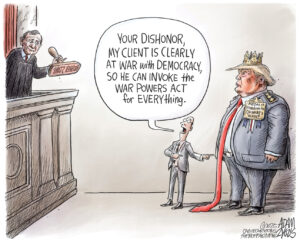
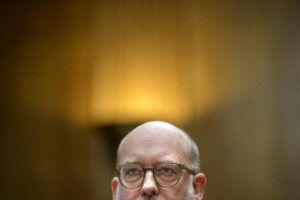
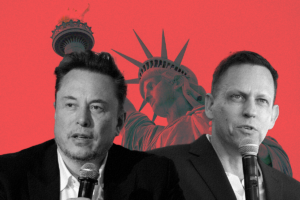
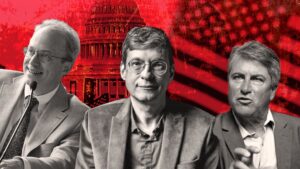

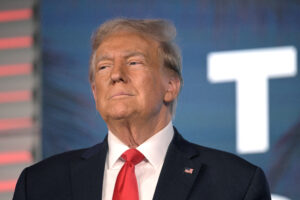
You need to be a supporter to comment.
There are currently no responses to this article.
Be the first to respond.